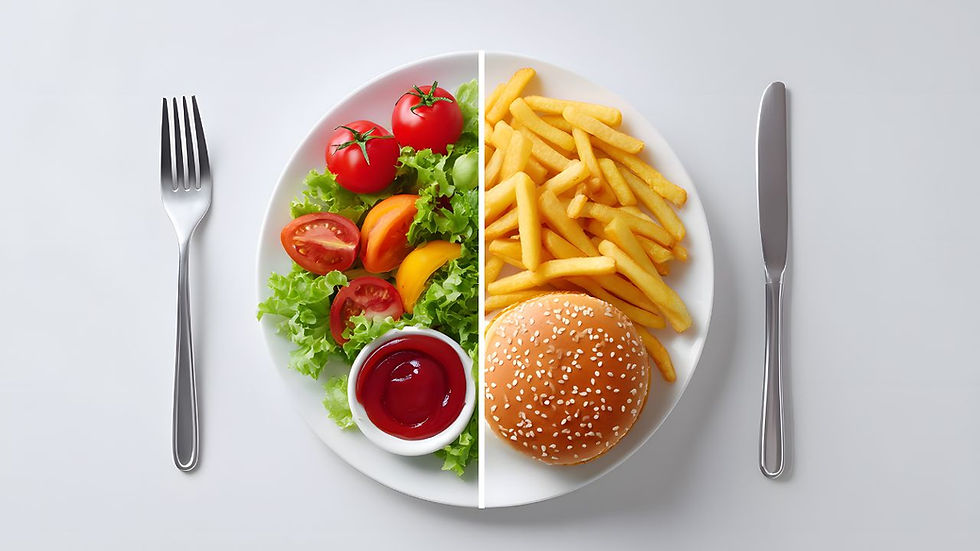Are there any dietary recommendations to follow around the time of injection?
- AJ Hill Aesthetics

- Sep 29, 2025
- 3 min read
Dietary habits do not affect how Wegovy is absorbed since it is injected under the skin. However, NHS advice suggests avoiding very rich or fatty meals during dose escalation, as these may worsen nausea. Many people find it helpful to eat smaller, protein-rich meals around injection day to support comfort. Staying well hydrated also reduces the risk of stomach upset in the first few months.
Why food choices matter with Wegovy

Although Wegovy (semaglutide) bypasses the digestive tract when injected, it works partly by slowing stomach emptying. This means that what and how you eat can influence side effects, especially during the early weeks of treatment. NICE TA875 and NHS patient guidance both note that nausea, reflux, and diarrhoea are most common during dose increases. While food does not change the way the medicine is absorbed, certain meals may make these symptoms more noticeable. Adjusting diet around injection day can therefore improve comfort and help people stick with the treatment.
Common triggers to avoid
NHS weight management teams often advise patients to reduce high-fat, spicy, or fried foods during dose escalation. These meals take longer to digest and may worsen the “fullness” effect of semaglutide, triggering nausea or reflux. Sugary drinks and alcohol can also irritate the stomach, especially if side effects are already present. In the STEP trials, participants were encouraged to follow balanced, reduced-calorie diets alongside injections, and clinicians observed that people who avoided heavy meals around injection days tolerated the medicine better.
The role of smaller, balanced meals

Many people find it easier to eat little and often rather than having three large meals. Smaller portions reduce pressure on the stomach, helping to prevent bloating or sickness. Adding protein — such as lean meat, eggs, beans, or yoghurt — helps maintain energy and satiety even if meals are lighter. NICE and NHS guidance consistently highlight the importance of combining semaglutide with healthy dietary patterns. This means not just cutting calories, but also focusing on nutritional quality to support weight loss and protect muscle mass.
Staying hydrated

Hydration is another simple but important part of managing early side effects. Wegovy can cause constipation or diarrhoea, and both are worsened if fluid intake is low. NHS services often recommend drinking water regularly throughout the day, aiming for around 6–8 glasses unless otherwise advised by your doctor. Fluids with electrolytes may help if vomiting or diarrhoea is persistent. In the STEP-1 and STEP-5 studies, participants who stayed well hydrated were more likely to remain on treatment, suggesting that hydration supports both comfort and adherence.
Evidence from clinical trials
The STEP clinical programme required all participants to follow lifestyle interventions, including diet changes and increased physical activity. Although specific “injection day” diets were not tested, clinicians observed that those who adjusted their eating patterns to manage nausea coped better with escalation. SELECT, which focused on cardiovascular outcomes, used the same approach: semaglutide was combined with lifestyle support, and patients were advised on practical steps such as moderating alcohol and keeping balanced diets. This consistent advice reflects the NHS approach today.
Support from NHS teams

Dietary guidance is a routine part of NHS weight management programmes that prescribe Wegovy. Dietitians, nurses, and pharmacists all contribute tips tailored to each patient. For example, people who experience morning nausea may find it easier to inject later in the day, after a light meal. Others may benefit from bland foods like toast, rice, or bananas around injection time. These small, individual adjustments help people stay comfortable while continuing to benefit from the medicine. NICE TA875 highlights the importance of embedding lifestyle and nutrition advice into every stage of treatment.
Longer-term diet considerations
While short-term tweaks help manage side effects, the longer-term goal is a sustainable, balanced diet. Research shows that weight loss is most successful when medicine is combined with lasting lifestyle change. NHS dietary recommendations for people on GLP-1 medicines emphasise vegetables, wholegrains, lean protein, and reduced processed food. This approach supports both weight management and cardiovascular health, aligning with the broader benefits demonstrated in the SELECT trial. By contrast, irregular eating, very restrictive diets, or skipping meals can worsen side effects and reduce the sustainability of progress.
What this means in practice
Wegovy does not interact directly with food, but your eating habits can make a big difference to how comfortable treatment feels. Avoiding very fatty or spicy meals around injection day, eating smaller protein-rich portions, and staying hydrated are all simple ways to reduce nausea and stomach upset. NHS and NICE guidance place equal emphasis on medicine and lifestyle change, showing that both work together to achieve long-term results. What this means in practice is straightforward: a few small adjustments to diet around injection time can keep side effects manageable and support the full benefits of Wegovy.



